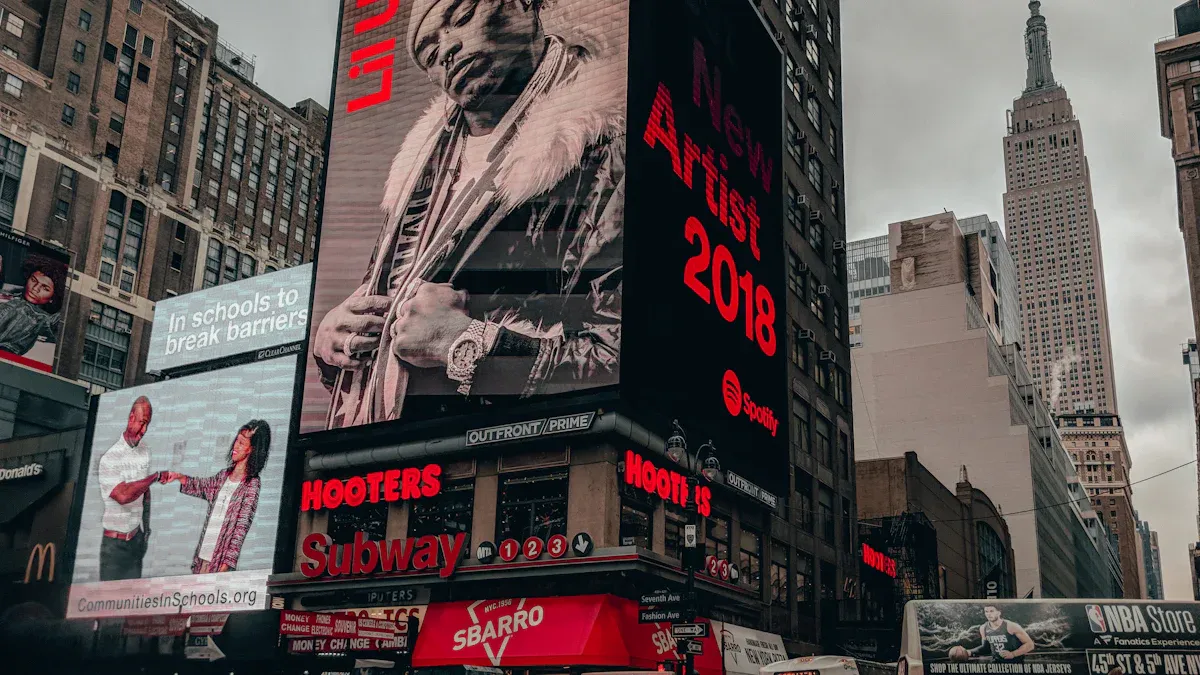For information about how Screenfluence can help your business with digital signage, please don’t hesitate to contact us by calling 1-844-772-7336 or emailing info@screenfluence.com.
Contact UsBenefits of Using Social Media to Optimize Digital Signage
Enhancing Engagement Through Real-Time Content
Real-time content is a game-changer for digital signage. Imagine walking into a store and seeing live updates about flash sales or customer reviews displayed on a screen. This kind of dynamic content grabs attention and keeps your audience engaged. For example, retailers often use digital menu boards to update pricing or availability instantly, creating a seamless viewer experience. Similarly, showcasing customer feedback or social media posts builds trust and fosters community engagement.
Interactive campaigns also play a big role here. By integrating QR codes or live hashtags into your digital signage content, you can encourage customers to participate actively. Whether it’s scanning a code for a discount or seeing their social media post featured on a screen, these strategies make your content more engaging and memorable.
Increasing Visibility with Social Media Integration
Social media signage is a powerful tool to boost visibility. By merging your online presence with physical displays, you can amplify your brand’s reach. For instance, brands like Gucci have successfully used TikTok and augmented reality (AR) campaigns to engage younger audiences, achieving billions of views and significant increases in brand awareness. Similarly, Nike displays custom shoe designs tweeted by customers on in-store screens, creating a buzz and driving foot traffic.
Integrating live social media feeds into your digital signage content also keeps it fresh and relevant. This approach not only enhances audience engagement but also broadens your brand’s visibility by connecting your physical and digital marketing efforts seamlessly.
Boosting ROI with Targeted and Interactive Campaigns
Targeted campaigns are essential for digital signage optimisation. By tailoring your content to a specific target audience, you can deliver messages that resonate and drive action. This strategy ensures you’re not wasting resources on uninterested viewers, which ultimately boosts your ROI. For example, personalized advertising creates a positive experience for customers, increasing their loyalty and lifetime value.
Interactive elements like touchscreens or motion sensors can further enhance customer engagement. Real-time performance tracking also allows you to refine your strategy based on data, ensuring your campaigns remain effective. When done right, these tactics not only optimize digital signage but also maximize your returns.
Strategies for Creating Effective Digital Signage Content

Leveraging User-Generated Content for Authenticity
User-generated content is one of the most powerful tools for creating effective digital signage content. It adds authenticity and builds trust with your audience. Imagine walking into a store and seeing real customer photos or reviews displayed on a screen. This approach not only enhances the viewer experience but also influences purchase decisions. You can even repurpose existing social media posts to keep your displays fresh without constantly creating new content.
Want to make it more engaging? Try running a contest where customers share their experiences with your brand. Offer rewards for the best entries and showcase them on your digital signage. This strategy fosters a sense of community while boosting audience engagement. Here’s a quick breakdown of how you can use user-generated content effectively:
| Strategy | Description |
|---|---|
| Enhancing Visual Appeal and Storytelling | Use compelling visuals to create emotional connections and memorable experiences. |
| Implementing UGC Contest Campaigns | Encourage participation through contests with rewards, fostering engagement. |
| Repurposing Content for Maximum Impact | Utilize existing social media content to keep displays fresh and engaging. |
| Integrating UGC Seamlessly into Retail | Display real customer photos and reviews to build trust and influence purchases. |
Displaying Live Social Media Feeds for Dynamic Interaction
Live social media feeds can transform your digital signage into a hub of dynamic content. By showcasing real-time posts, reviews, or testimonials, you create a sense of immediacy and relevance. For example, restaurants often display tweets or Instagram posts from happy customers, while event organizers use live feeds to highlight attendee posts. This not only boosts audience engagement but also encourages others to join the conversation.
You can also use a social media aggregator to display posts from specific hashtags or accounts. This strategy works wonders during live events or product launches, where real-time interaction is key. Retailers, for instance, often use digital signage to promote sales or new products by featuring live social media updates. The result? A more interactive and engaging viewer experience that keeps your audience coming back for more.
Using Branded Hashtags to Drive Campaign Engagement
Branded hashtags are a simple yet effective way to enhance your digital signage optimisation efforts. They encourage your audience to interact with your brand online and share their experiences. Campaigns like #ShareACoke by Coca-Cola and #ShotOniPhone by Apple have shown how powerful hashtags can be in driving engagement and visibility.
To make the most of this strategy, prominently display your branded hashtags on your digital signage. Provide clear instructions on how to use them and offer incentives for participation. For example, Disney’s #ShareYourEars campaign raised over $2 million for Make-A-Wish by encouraging users to share photos with Mickey Mouse ears. Similarly, Nike’s #JustDoIt inspires a community around healthy lifestyles, creating a lasting connection with their audience.
Here are some standout campaigns that used branded hashtags effectively:
| Campaign Name | Brand | Description |
|---|---|---|
| #ShareACoke | Coca-Cola | Personalized bottles with names, encouraging social sharing. |
| #ShotOniPhone | Apple | Users share creative photos taken with iPhones, showcasing user-generated content. |
| #JustDoIt | Nike | Inspires healthy lifestyles and positive action, creating a community around the brand. |
| #ShareYourEars | Disney | Raised over $2 million for Make-A-Wish by encouraging sharing photos with Mickey Mouse Ears. |
By integrating branded hashtags into your digital signage content, you can create a buzz around your campaigns and foster a deeper connection with your audience.
Best Practices for Aligning Social Media and Digital Signage

Maintaining Consistency with Brand Identity
Consistency is key when it comes to aligning your digital signage with social media. You want your audience to instantly recognize your brand, whether they’re scrolling online or walking past a screen. Start by creating a detailed brand guide that outlines your mission, values, voice, and visual elements. Share this guide with your team to ensure everyone stays on the same page. Regularly audit your materials to confirm they align with your brand identity.
To take it a step further, integrate your social media campaigns with your digital signage. Use the same themes, colors, and messaging across both platforms. This approach reinforces your brand’s message and makes it more memorable. Consistent branding not only builds trust but also communicates your unique value effectively.
Tailoring Content to Audience Preferences
Your audience should always be at the center of your digital signage content strategy. Tailoring your content to their preferences can significantly boost engagement. Start by conducting market research or analyzing demographics to understand what your audience values. Pay attention to feedback—what they notice, like, or ignore. This insight helps you create content that resonates.
Real-time data collection is another game-changer. By monitoring metrics like dwell time or interaction rates, you can adjust your content on the fly. For example, if a particular design element isn’t working, tweak it to better suit your audience’s tastes. This responsiveness shows you’re listening and keeps your content relevant.
Regularly Updating Content for Relevance and Freshness
Stale content can quickly lose your audience’s interest. Keep your digital signage fresh by updating it regularly with timely messages. Automated content management systems can help you schedule updates and incorporate real-time elements like news or weather. Seasonal updates or rotating imagery also keep your displays engaging.
Dynamic content updates are another great way to maintain relevance. For instance, you can feature live social media feeds or user-generated content to keep things exciting. Always align your updates with your audience’s interests and demographics. By doing so, you ensure your digital signage remains a valuable part of their experience.
Measuring and Improving Engagement with Analytics
Tracking Key Metrics for Social Media and Digital Signage
Tracking the right metrics is essential for evaluating the success of your digital signage campaigns. Start by monitoring how your audience interacts with your content. Are they engaging with it? Look at metrics like likes, shares, and comments on social media posts tied to your digital signage. Analyze sales data to see if your campaigns are driving purchases. For example, you might notice a spike in sales after launching a new promotion on your screens.
Customer feedback is another valuable metric. Conduct surveys or casual conversations to understand how people feel about your content. A/B testing can also help you refine your strategy. Experiment with different designs or messages to see what resonates best. Finally, set clear KPIs (Key Performance Indicators) to measure your progress. These could include engagement rates, conversion metrics, or even foot traffic.
Using Data Insights to Refine Content Strategies
Data insights can transform your content strategy. For instance, businesses in retail, healthcare, and hospitality have used analytics to improve customer experiences and boost engagement. Here’s how:
| Sector | Example | Data Insights Utilized | Outcome |
|---|---|---|---|
| Healthcare | Laser Clinics | KPIs on patient engagement and satisfaction | Improved patient experience and workflow efficiency |
| Hospitality | CTM Media Group | Viewer engagement KPIs | Over 4.3 million interactions and boosted brand awareness in 2019 |
| Retail | Famous Footwear | Engagement levels and conversion rates | Increased foot traffic and sales, leading to further rollouts |
By analyzing these insights, you can identify what works and adjust your content accordingly. For example, if user-generated content drives more engagement, you might focus on incorporating more of it into your digital signage.
Tools for Monitoring and Optimizing Performance
Using analytics tools can make tracking and optimizing your campaigns much easier. Start with tools that monitor viewer counts and watch time. Sensors can track movement and presence, helping you understand how your audience interacts with your digital signage. Linking sales data to your campaigns can also reveal which strategies are most effective.
Here are some additional tools to consider:
- Automated content delivery systems reduce manual scheduling by setting parameters for when and where content appears.
- Dynamic content tools adjust your displays based on factors like weather or traffic levels.
- Emergency messaging features allow you to quickly communicate important updates, interrupting ongoing campaigns if necessary.
These tools not only save time but also ensure your content stays relevant and engaging. By using analytics effectively, you can continuously improve your digital signage optimisation efforts and maximize your ROI.
Integrating social media with digital signage offers incredible benefits for your brand. It enhances engagement by displaying real-time content and user-generated posts, making your displays more dynamic and relatable. This strategy amplifies your reach, encourages audience participation, and even grows your online community. Plus, showcasing social media handles on your screens can boost followers effortlessly.
To get started, apply the strategies and best practices we’ve discussed. Tailor your content to your audience, keep it fresh, and align it with your brand identity. Don’t forget to use analytics tools to track performance and refine your digital signage optimisation efforts. With the right approach, you’ll create engaging campaigns that leave a lasting impact.



